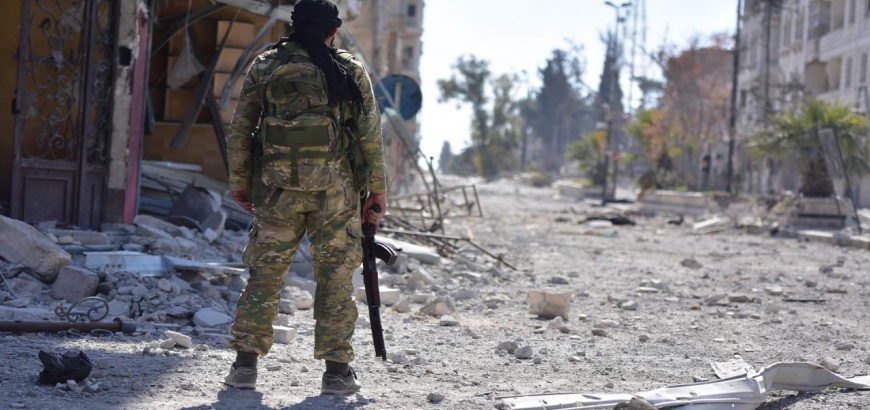Jaish al-Isam (Army of Islam), one of the main Syrian rebel groups in the Eastern Ghouta, said on Wednesday that “opposition fighters will defend the Ghouta and there will be no negotiations to leave it” in accordance with a Russian proposal.
Hamza Birqdar, official spokesman for Jaish al-Islam, told Reuters that there are not any negotiations about this issue. "The factions of Ghouta and their fighters and its people are holding onto their land and will defend it,” he said.
Russia, one of President Bashar al-Assad’s strongest allies, whose fighter planes have participated in the fierce campaign on the Ghouta, proposed safe passage for opposition fighters from the Ghouta with their families and personal weapons, which was rejected by the rebel groups.
The Faylaq al-Rahman spokesman, Wael Alwan, yesterday denied that the group had any communication with the Russians, and said that the opposition forces would continue to repulse the assault being waged by Assad’s forces and Iran-backed militias with Russian air support.
The Syrian opposition has confirmed its rejection of expelling the residents of the Eastern Ghouta, which has been under siege by the Assad regime for years, and the creation of demographic change in the area by making people choose to leave, surrender or die by warplanes and heavy daily bombardment.
Regarding the course of the military operations in the Ghouta, Alwan said in a series of tweets that rebel fighters had “stopped the collapse which occurred in the lines of defense on the eastern front of the Ghouta and the fighting had begun to take on a different character after shoring up many of the points and frustrating a number of attempts to break through.”
Alwan added that “Faylaq al-Rahman’s fighters, in coordination with other rebel groups, had entered into back-and-forth battles and defensive skirmishes along the front and outskirts of Mouadamiyah and Mezraa al-Ab, and the outskirts of Douma, in addition to repulsing attempts by the regime to break through on the Mezraa al-Asha’ari side,” while Assad’s forces suffered heavy losses on all these fronts, as he put it.
The Faylaq spokesman said that “Assad’s forces and supporting Iranian militias depend on heavy Russian air raids and on broad artillery and missile cover (scorched earth) which has forced the opposition to rely on guerrilla warfare tactics and ambushes, which has bled the enemy’s forces and inflicted heavy losses in its ranks.”
The regime's forces are trying through their military operation to divide the Ghouta into two strips, thereby weakening opposition forces and making it easier for the regime to take control in the future.
The Ghouta is the last major opposition stronghold near Damascus and is one of the “de-escalation” zones agreed upon in the Kazakhstan capital of Astana in 2017.
Regime forces have been blockading about 400,000 civilians in the Ghouta since the end of 2012, preventing food and medical necessities from entering.
This article was translated and edited by The Syrian Observer. Responsibility for the information and views set out in this article lies entirely with the author.


